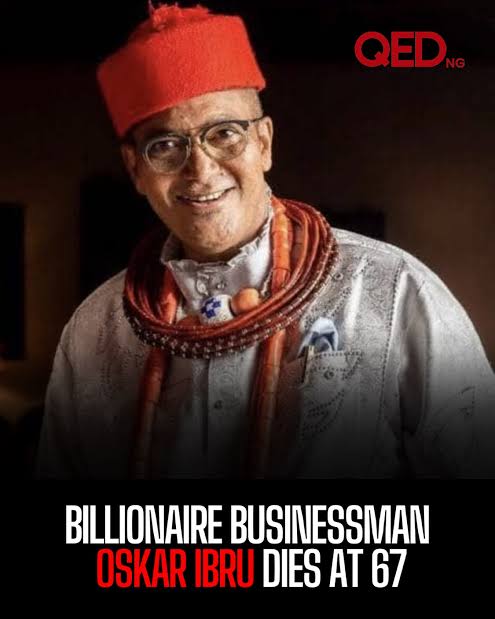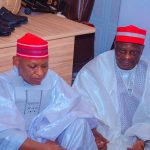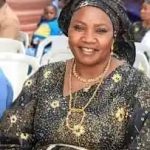Tribute to Late Oskar Ibru: The King of the Boys
By Wilson Macaulay
The death of Olorogun Oskar Ibru came like thunder on a clear day. It was the least expected news, the kind that leaves the heart heavy and the tongue lost for words. For the Urhobo nation, for Delta State, and for Nigeria at large, his passing is not just the departure of a man—it is the closing of a chapter, the fading of a light that shone brilliantly across business, culture, and society. Oskar Ibru was not merely a name; he was an institution, an aristocrat in a unique class, a global citizen, and to many who had the privilege of meeting him, “The King of the Boys.”
To borrow from the words of Sir Olufemi Otedola he had his life ticket to rest jejelly at Monaco.
The Aristocrat from Birth
Oskar Ibru lived a life that never crossed paths with poverty. Born into the illustrious Ibru dynasty, wealth and privilege were his birthright, yet he carried them with a natural grace. He was fondly nicknamed “The Buckingham Merchant ” by those who marveled at his style, his aristocratic ease, and his uncanny ability to live in a world set apart. But unlike many who are born into affluence, Oskar did not retreat into isolation. He understood people. He touched lives. He gave freely. He carried the poise of nobility, yet he laughed, joked, and mingled as though he were one of us.
My own fascination with Oskar began in 1987 when he got married at the age of 27. His wedding was a spectacle that stamped him indelibly in my mind. His bride, Wanda Elaine Swann
just 25, then flew in from Washington, D.C., where she worked in the American Archives and already held a green card. Their union was the stuff of fairy tales, a celebration attended by Nigeria’s high and mighty. The Nigerian Television Authority (NTA), then the widest-reaching network, carried the event live. Lagos Life Magazine was on the ground. The Guardian Newspaper, owned by the Ibru Organization, and many information outlets were there to immortalize the ceremony in print. I remember watching the spectacle on television and concluding that this was no ordinary man. He was, indeed, in a class of his own.
My Encounters with Oskar
Though I admired him from afar, fate eventually brought me into his orbit. My first encounter with Oskar came at Chief James Ibori’s residence in Oghara, where I was present as a journalist covering an event. Oskar’s entrance was regal, yet his demeanor approachable. True to his nature, he recognized the presence of the press and, in typical generosity, “dashed” us some cash. I made sure to shake his hand that day, and I carried that handshake like a medal of honor. It was not just money he gave; it was validation, acknowledgment, and respect.
Another memorable encounter occurred at the burial of Chief William Ibori. Chief William had played a pivotal role in my career by facilitating my employment at Daily Independent Newspaper. Naturally, I was deeply involved in the ceremonies. When Oskar arrived, I ushered him to the VIP section, where dignitaries such as Chief James Ibori, former Governor Emmanuel Uduaghan, and then Governor Godwin Obaseki were seated. Again, Oskar noticed my role, appreciated it, and rewarded me. That was who he was—a man who noticed even the smallest gestures and responded with kindness.
The last time I saw him was at the grand opening of the Monarchy Centre in Warri, a project owned by billionaire Chris Iyovwaye, who was celebrating his 60th birthday. Oskar arrived in his usual understated grandeur. As I approached to usher him in, he leaned towards me and whispered that he needed to visit the restroom. I immediately led him there, ahead of his official protocol team. I remember how the security men, who would normally brush people aside, suddenly began to greet me with “Yes, sir,” as they saw me walking and talking closely with Oskar. Later at the event, he instructed one of his aides to hand me money. That was the last time I saw him. I never knew it was my final moment with him. He did not know me closely or deeply, yet he showed me love. That was Oskar—one who gave without needing to be asked.
A Global Citizen
To describe Oskar as a businessman is to understate his influence. He was a global citizen, an Ivy League–trained intellectual, a cultural heritage preserver, and a corporate trailblazer. He had access to any personality he wished to meet, whether within Nigeria or across the globe. His name opened doors, but it was his charm and authenticity that kept them open.
As Chairman of the Ibru Organization, he carried forward the family’s corporate empire with style and foresight. But beyond the boardroom, Oskar’s influence was felt in society through his philanthropic gestures. At one point, he approved over one billion naira to address a road project, a roundabout beautification scheme, and the refurbishment of dilapidated classrooms in Lagos State—all as part of the corporate social responsibility of the Ibru Organization. For him, wealth was a tool to create impact, not just an inheritance to be enjoyed.
The King of the Boys
Those of us who called him “The King of the Boys” knew exactly why. Oskar was not a man who kept people at arm’s length. He mixed freely, shared jokes, gave generously, and made everyone—from the humblest to the most exalted—feel noticed. Aristocrats often live behind a veil of exclusivity, but Oskar was different. He loved life, loved people, and lived fully in every moment. He could sit with the high and mighty in Abuja or London and the next moment crack jokes with boys on the streets of Warri. His world was different, yes, but he never denied others entry into it.
Political Aspirations
Oskar was also a man of political courage. At different times, he tested the waters of leadership in Delta State, driven by the conviction that he had something to offer his people. Though his forays into politics did not yield the seat of governance, his willingness to step into the arena reflected his heart for service. He was not content to merely watch from the sidelines; he wanted to contribute, to build, to lead. His candidacy represented a rare blend of aristocracy and grassroots appeal.
A Legacy of Generosity and Culture
Oskar’s life cannot be separated from the legacy of the Ibru family, one of Nigeria’s foremost dynasties. Yet, within that legacy, he carved out a unique identity. He was passionate about preserving Urhobo culture and promoting Nigerian heritage. At social gatherings, he embodied the dignity of tradition while still displaying the flair of modern aristocracy. He was equally at home in the palace as he was in the boardroom or at a cultural festival. That balance made him a bridge between worlds.
Philanthropy was another cornerstone of his legacy. Whether through corporate interventions, personal donations, or spontaneous acts of generosity, Oskar ensured that his wealth touched lives. Many journalists, including myself, have stories of his kindness. Many communities benefited from his interventions. Many young people were lifted by his support. He believed in giving, and he practiced it until his last days.
Farewell to a Legend
As I reflect on his life, I realize that Oskar Ibru was not just a man of means; he was a man of meaning. He lived richly, but more importantly, he lived respectfully. His laughter, his generosity, his presence at events, his willingness to give—even to those he barely knew—will be remembered long after the grief of his passing subsides.
Rest well, Olorogun Oskar Ibru. You were larger than life, a prince among men, a king among the boys. You lived as though the world was a stage, and you performed with grace, humor, and generosity. The Urhobo nation, Delta State, and Nigeria will remember you not just as a scion of the Ibru dynasty, but as a man who knew how to live, how to give, and how to love.
You have paid your dues. now, rest blissfully in the peace of eternity.












